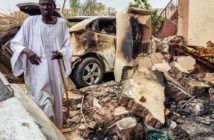Many questions about Islam…
The attacks of Brussels, that followed those of Paris and Tunisia, and the subsequent disappearing of the Egypt Air plane in the Aegean Sea have revived the polemic discussion about the violence of Islam that has recently infested the social media.
Addressed very carefully in the ‘mass’ media, this debate has been carried onto the main stage by The Maghreb and Orient Courier, who repeatedly focused on this issue, eminently present in the minds of people, be they in the Orient or in the Occident.
The editorial team has given the word to fundamental Salafists, as well as to partisans of a ‘moderate’ Islam, often called ‘Islam of France’, of that country where the debate seems more vivid than elsewhere, be it in Germany, in the UK or in Italy, where the Muslim community is also very strong within society.
The web dares to crudely ask, without detours, those questions that make angry and to which the direct and frank responses that are sometimes given disturb even more…
“Why do ‘moderate’ Muslims oppose the Quran to the Sunna; and the Sunna to the Quran, to decide how to behave in this or that case? Should they not choose once and for all which of the two texts has more value than the other? Unless… Unless that switching in between the Sunna and the Quran might reveal an attitude of accommodating technicalities that would allow everyone to arrange the texts in a given moment, suited to a given situation…”
“Why does the ‘European Islam’ question through exegesis all that is disliked in the West? Why, when the Quran says that there is only one God, do the Muslims of Europe admit to it without taking on a long reflexion of interpretations on this topic? And why, on the other hand, do they throw themselves into torturous exercises of going around the rules, when the same Quran says that it is permitted that a husband may beat his wife? Ah, well… Yes, of course! It is because this rule of the Quran is in opposition to the laws of Europe! Then, of course, it needs to be ‘interpreted’…”
“The Salafists do not apply the true Islam? Is there not a large part of hypocrisy in what is qualified as ‘moderate’ Islam? And a mass of small personal arrangements?”
The answer can shock, hurt, disturb, because it is often unpleasant to lift the veil. But the word is also to those who take the risk of writing it!
The other big question of the moment is of course the evolution of the war, which according to some analysts, could turn short for the Islamic State, fought with success by the regular Syrian army, supported by the Russian air force, and by the Shi’ite militias of Iraq, who have done more than supplement the weakness of the Iraqi army and are pushing back the Jihadists of the Caliph Ibrahim on all fronts.
But, more immediately, it is the future of the Kurdish nation that attracts the attention of the observers; at a time when Baghdad has entirely lost control of the Iraqi Kurdistan, whose president, Massoud Barzani, calls to a new referendum on independence, and where the little Turkish game of crushing the Kurds of Syria by logistically and militarily supporting the fighters of the Islamic State is ending.
The Kurds have the wind in their sails and nothing stops them anymore from imposing their rules in this regional game that captures the entire world.
In Syria, the Kurdish forces seem to have agreed to some terms with the regime of Bashar al-Assad, with whom they now fight the troops of the Islamic State and of al-Qaeda in Syria (Jabhet al-Nosra, which still holds a large part of the Idlib governorate and has replaced the revolutionaries of the first hour in Aleppo). But the Kurds also joined the regular Syrian army in their fight against the relics of the lost revolution, the last brigades of the Free Syrian Army, attacked from all sides and reduced to defending an indefensible small zone in the north-west of the governorate of Aleppo. The recent offensive of the Kurdish forces (YPG) in direction of ar-Raqqa, the capital of the Islamic State, could hence inaugurate the beginning of a forced federalisation of Syria…
In Iraq, the Peshmergas seem to have reached nearly all their territorial objectives… and renounced to pursue the fight against the Islamic State any further.
All along the front begins to rise, along hundreds of kilometres, an impressive limes, an uninterrupted network of fortifications built by Kurdish fighters, which materialises the border of a Kurdistan, whose political chiefs in Iraq promise more and more openly the independence before the end of 2016; with the blessing of their allies in Ankara – they would be too happy to see a standing border of an Iraqi Kurdistan, de facto excluding the Kurdish territories of Syria and Turkey.
It is here that the Kurdo-Kurdish imbroglio becomes highly interesting: if the Kurdistan Democratic Party (KDP), the political toy of Barzani, perfectly accommodates the plans of its main regional supporter, the Sultan Erdogan, and readies itself to sacrifice its brothers of Syria and Turkey, then the Patriotic Union of Kurdistan (PUK), the other big Kurdish party in Iraq, does not see the situation with the same eye and supports the efforts of the PKK with all its strength, promoting the YPG in Syria, the Kurdish forces in Syria, which the Peshmerga of the KDP shamelessly isolate by closing the Iraqi border to all support and relief destined to them… Tensions are worsening, negatively affecting the oil price, another topic of fierce dispute among the Kurdish factions… What shall be the outcome of this showdown that once again puts up the Kurds against each other and reminds of the civil war, that the Kurdish people suffered in the 1990s?
An issue and a unilateral Kurdish determination, which without doubt would come to the detriment of the West engaged in this conflict, especially Washington, by hastily deciding the entire future of the region, of Syria, of a ‘Sunnistan’, separated from a then amputated Iraqi state, and of the broader local geo-strategy with its essential elements that weigh out every other consideration, in Riyadh and in Tehran, whose repositioning bring their bunch of (bad) surprises, as one can see in Yemen already, at the heart of these disillusioned and overwhelmed populations of the Middle-East, ravaged by too many years of a vast and incessant conflict that will soon not leave anything behind to be destroyed.



